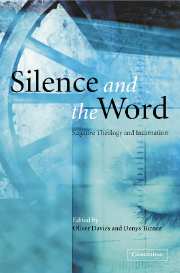Book contents
- Frontmatter
- Contents
- Notes on contributors
- Preface
- Introduction
- 1 Apophaticism, idolatry and the claims of reason
- 2 The quest for a place which is ‘not-a-place’: the hiddenness of God and the presence of God
- 3 The gift of the Name: Moses and the burning bush
- 4 Aquinas on the Trinity
- 5 Vere tu es Deus absconditus: the hidden God in Luther and some mystics
- 6 The deflections of desire: negative theology in trinitarian disclosure
- 7 The formation of mind: Trinity and understanding in Newman
- 8 ‘In the daylight forever?’: language and silence
- 9 Apophasis and the Shoah: where was Jesus Christ at Auschwitz?
- 10 Soundings: towards a theological poetics of silence
- Select bibliography
- Index
9 - Apophasis and the Shoah: where was Jesus Christ at Auschwitz?
Published online by Cambridge University Press: 22 September 2009
- Frontmatter
- Contents
- Notes on contributors
- Preface
- Introduction
- 1 Apophaticism, idolatry and the claims of reason
- 2 The quest for a place which is ‘not-a-place’: the hiddenness of God and the presence of God
- 3 The gift of the Name: Moses and the burning bush
- 4 Aquinas on the Trinity
- 5 Vere tu es Deus absconditus: the hidden God in Luther and some mystics
- 6 The deflections of desire: negative theology in trinitarian disclosure
- 7 The formation of mind: Trinity and understanding in Newman
- 8 ‘In the daylight forever?’: language and silence
- 9 Apophasis and the Shoah: where was Jesus Christ at Auschwitz?
- 10 Soundings: towards a theological poetics of silence
- Select bibliography
- Index
Summary
George Steiner in his recent autobiography recalls his friendship with Donald MacKinnon and says:
There could, for Donald, be no justifiable future for Christianity so long as Christian theology and practice had not faced up to, had not internalized lucidly, its seminal role in the millennial torments of Judaism and in the Holocaust. Primarily, this signified coming to terms with the horror of Golgotha, a horror unredeemed – this was Donald's compulsive instinct – by the putative wonder of resurrection or by any promise of celestial reparation.
Steiner also writes of MacKinnon ‘trying to “think” Auschwitz and Golgotha as implicated in some interrelated finality’.
Golgotha and Auschwitz are also connected by Rabbi Dr Nicholas de Lange in his 1997 Cardinal Bea Memorial Lecture, in which he presses the question which I have included in my title, ‘Where was Jesus Christ at Auschwitz?’, and de Lange is himself drawing on what his own teacher, Ignaz Maybaum, said on this theme.
Both Jesus Christ and the Holocaust (or Shoah, as I will refer to it) invite thought about ‘silence and the word’, and I will explore the theme with special reference to one text by Anne Michaels related to the Shoah, and another on Christology by Dietrich Bonhoeffer.
SILENCE AND THE WORD IN FUGITIVE PIECES
Anne Michaels is a poet–novelist who steeped herself in the history and eyewitness testimony of the Shoah during the writing of her novel, Fugitive Pieces.
- Type
- Chapter
- Information
- Silence and the WordNegative Theology and Incarnation, pp. 185 - 200Publisher: Cambridge University PressPrint publication year: 2002



